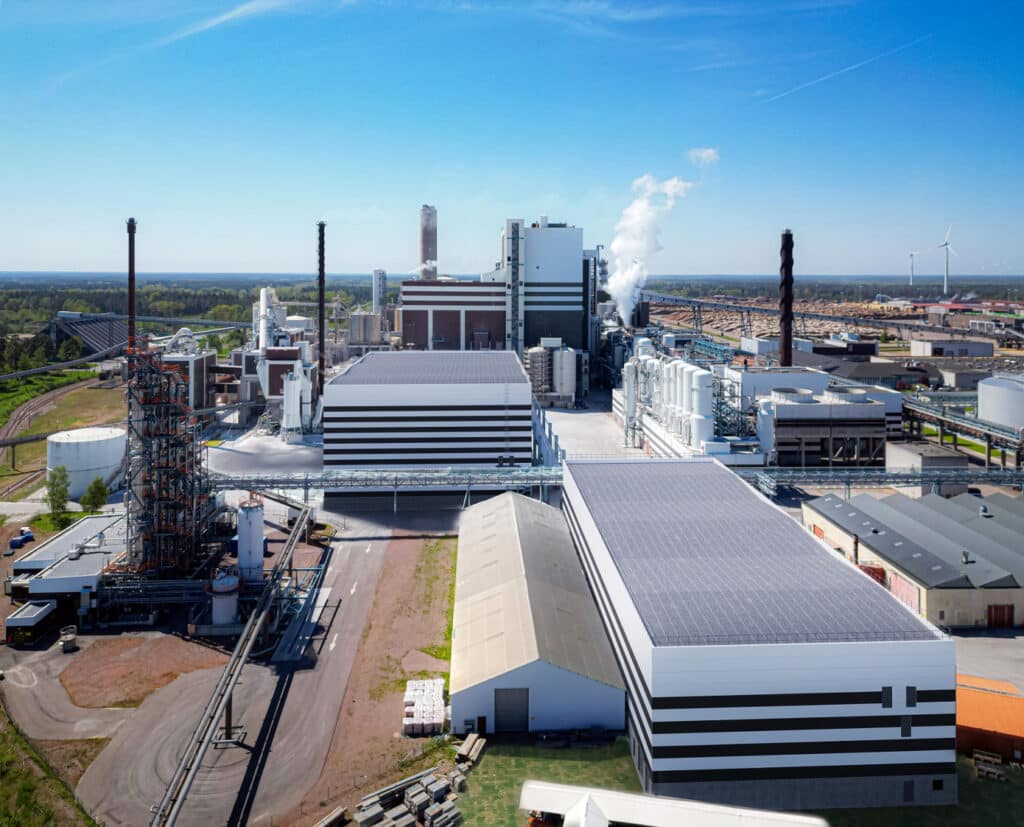You can build (almost) anything from wood, now one of the world’s top forest companies is building the world’s largest kraft lignin factory.
Announced overnight, Södra —which last year opened the world’s greenest cross-laminated timber plant in Värö —is investing US $190m (or SEK 2b) to establish the massive plant at Mönsterås in Sweden on a site adjacent to the world’s first bioethanol plant, established in 2020.
It comes as material scientists from across the world are now partnering with the world’s largest forest companies to develop a suite of new, fully circular products using Lignin, a wood composite traditionally discarded when manufacturing pulp-based products.
According to Södra, “Kraft lignin (has the potential to) replace fossil materials in, among other things, glue, batteries, rubber, composites and form the basis for new biofuels and biostimulators.”

In response to the EU’s Green New Deal, Europe’s forest giants, including Södra, are turning to kraft lignin production to create value-added products to help with the green transition and increase the forest estate’s commercial profitability.
“The forest is being called on for many things as society seeks to replace fossil-based materials,” said Lotta Lyrå, the President and CEO of Södra. “To succeed in that transition, sustainability and profitability need to go hand in hand, and Södra’s kraft lignin investment is a good example.”
“We will make more out of every tree and strengthen our profitability…this is a big investment for Södra and the green transition.”
Lotta Lyrå, President and CEO of Södra.
Södra is Sweden’s largest forest owners’ association – with 53,000 individual forest owners covering 2.8 million hectares, the average member has a forest plot of just 50 hectares. PEFC and FSC-certified, “the key for Södra is not to take more from harvest but improve recovery and add value to the forests harvested,” Ms Lyrå said.
Why the world’s top forest producers invest in material science
The push to extract more value from every piece of wood comes as the volumes of harvested timber are declining across Europe.
Value-enhancing the use of the primary components of wood, “Lignin, cellulose and hemicellulose”, is the key to future growth”, according to Duncan Mayes, the founder and principal of Helsinki-based Lignutech Oy, who said that Finland, and neighbour Sweden, are well positioned to capitalise on the green switch.
“These countries have always been a tradition of multi-sector integration, with the big forest companies having pulp mills, paper mills, board mills, sawmills and most recently mass timber plants combined in an industrial eco-system,” he said, adding, “These are highly integrated companies.”

This includes Metsa, which is partnering with ANDRITZ Pulp & Paper and Dow to build a new kraft lignin plant to produce bio-dispersant plasticisers for concrete and gypsum applications. Meanwhile, Stora Enso is now operating a pilot kraft lignin plant from its closed Sunila Mill.
“We have developed, for example, lignin-based glue, with the entire product being bio-based,” according to Satu Härkönen, Stora Enso’s head of communications. “We have also tested using Lignin as a substitute for bitumen, for example, in making asphalt.”
Duncan Mayes will be a panellist at the TimberConstruct conference in Melbourne from August 12 to 13, 2024. Participating in the “Unlocking Timber’s Potential” session, Mr Mayes’s presentation will explore “Engineered Wood Products of the Future.”
- TimberConstruct is Australia’s largest timber construction conference and exhibition, focused on materials and design, prefabrication, and building techniques. To learn more, visit TimberConstruct’s website.






